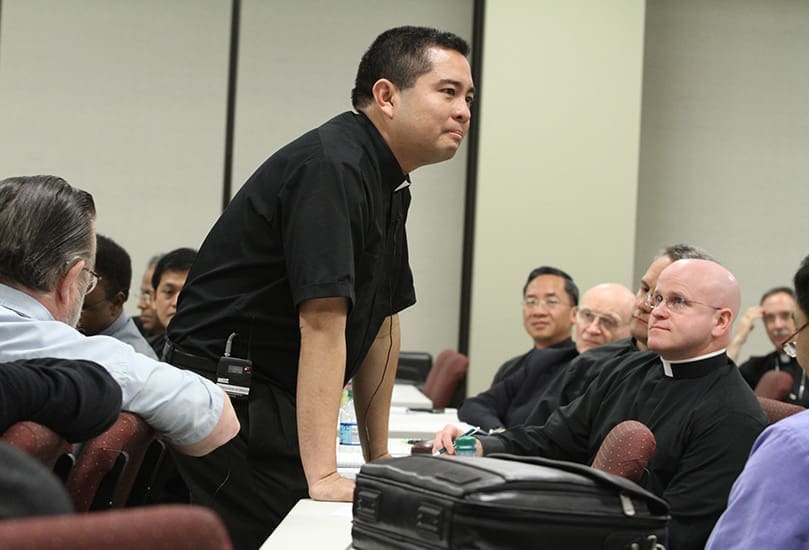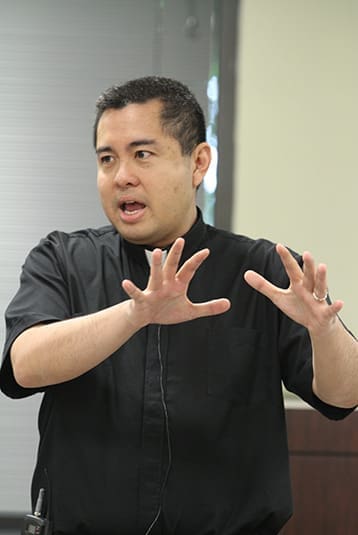 Photo By Michael Alexander
Photo By Michael AlexanderSmyrna
Dominican Offers Wisdom To Help Dying, Their Families
By STEPHEN O'KANE, Staff Writer | Published June 7, 2012
A “priests study day” on May 22 brought Dominican Father Nicanor Austriaco to the Archdiocese of Atlanta Chancery to discuss end-of-life issues with priests and deacons of the archdiocese.
A cancer researcher and an assistant professor of biology at Providence College in Rhode Island, Father Austriaco brings a unique perspective to these issues as he blends science and faith to form guidelines on pastoral bioethics for clergy.
Speaking to a group of some 50 priests and deacons, Father Austriaco shared stories of his observations as a Dominican brother, priest and hospital chaplain, as well as his varied experiences guiding people at the time of death. Present at many deaths in a medical setting, mostly at local hospitals, Father Austriaco believes more people need to be exposed to death, both to understand its power as well as how to help patients and families make moral medical decisions.
“We are called to care for our brothers and sisters,” said Father Austriaco, who added that his focus would be the pastoral role in times of crisis where bioethical questions arise.
Before one addresses these bioethical concerns, it is important to understand the role clergy play in these experiences, he said. For this, he referred to Blessed John Paul II’s papal encyclical Veritatis Splendor. He emphasized the importance of clergy providing a moral framework for people as well as making the sacraments available both to patients and family members.
In the context of bioethics, Father Austriaco explained how it is crucial for clergy to provide comfort for patients and families, reminding them of their union with Christ in suffering and helping them to understand death as a necessary step towards their growing union with God.
“I would like to propose to you that at the end of life, the number one passion, the number one emotion that you need to deal with, is fear,” said Father Austriaco. “You have to help your brother or your sister and his or her family deal with that strong emotion in order for that whole family to come to terms with a particular medical condition … and make a decision.”
The end of life is a moment for people to reflect on the past and prepare for the future, he said. Many people still hold onto things they did or that happened to them, which is why fear of what happens after death is so prominent. The sacrament of reconciliation can play a very important role in preparing people for death, said Father Austriaco.
“The sacraments are so much more powerful than anything I can say, especially at the end of life,” he said, adding that healing is as important for the family as it is for the patient.

Dominican Father Nicanor Pier Giorgio Austriaco said the two most common questions asked of patients near death are: Was my life worth it and where am I going? Photo By Michael Alexander
Addressing particular cases of medical intervention, Father Austriaco explained the difference between ordinary care and extraordinary care. He said extraordinary care is care that is morally judged to be burdensome to the patient, and ordinary care is morally judged not to be burdensome.
While he admitted this initial definition sounds a little vague, he explained that the decision on what is burdensome or not is made by the patient. These guidelines do not provide a “cookie-cutter solution” to medical decisions, but provide a framework from which to make decisions regarding various levels of intervention. The same intervention can be ordinary care in one person’s situation but extraordinary care in another person’s situation, he said.
Father Austriaco explained that one does not distinguish between ordinary care and extraordinary care based on medical criteria because the distinction is a moral judgment, not a medical one.
“We are required to embrace ordinary care—that is morally necessary—but extraordinary care is optional,” he said.
Some diocesan priests have more exposure to these situations than others. St. Joseph Church in Marietta is located less than a mile from Kennestone Hospital, and pastor Father John Walsh often gets called in to celebrate the sacraments with patients and families.
“I attended the conference because St. Joseph’s is very close to Kennestone Hospital and we get a lot of calls to visit patients and anoint them,” Father Walsh wrote by email after the event. “I found the conference helpful because it highlighted the peace and support that the sacraments give, as the moment of death approaches.”
“I found it to be a very fine conference,” he said.
Father Austriaco and the priests and deacons spent time discussing specific cases and scenarios, some that local clergy have dealt with firsthand and others that were theoretical situations. The two most important points emphasized were to provide comfort to the patients and families and to provide knowledge to help families discern which interventions are moral in the face of death.
“Many of our people have become insulated from death and don’t really understand and experience death,” Father Austriaco said. “Death is a moment of great grace. … It is the last lap of the race. And, like I tell my students, there is something incredible when you cross the finish line.”